|
|
|
Sort Order |
|
|
|
Items / Page
|
|
|
|
|
|
|
| Srl | Item |
| 1 |
ID:
162101
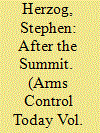

|
|
|
| 2 |
ID:
185994
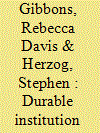

|
|
|
|
|
| Summary/Abstract |
The regime built around the 1970 Treaty on the Non-Proliferation of Nuclear Weapons (NPT) has helped curtail the spread of nuclear arms for fifty years. In hindsight, it is remarkable only nine states possess the world’s most powerful weapon. The NPT achieved much success during Cold War bipolarity and U.S. unipolarity in its aftermath. But today, China’s rise and Russia’s resurgence have ushered in a new era of emerging multipolarity. Can the treaty withstand the potential challenges of this dynamic environment? There is a real risk that multipolarity may shake the scaffolding of the nonproliferation regime, presenting a significant test to the NPT’s durability. This article identifies four essential elements of the nonproliferation regime: widespread membership, adaptability, enforcement, and fairness. History suggests bipolarity and unipolarity in the international system largely sustained and promoted these NPT features. When international regimes lack such elements, it sharply curtails their long-term efficacy.
|
|
|
|
|
|
|
|
|
|
|
|
|
|
|
|
| 3 |
ID:
150322


|
|
|
|
|
| Summary/Abstract |
It has been two decades since the nuclear Comprehensive Test Ban Treaty (CTBT) was opened for signature at the United Nations. So far, 183 states have signed and 166 have ratified the treaty, which U.S. President Bill Clinton called “the longest-sought, hardest-fought prize in the history of arms control.”
|
|
|
|
|
|
|
|
|
|
|
|
|
|
|
|
| 4 |
ID:
157827
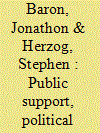

|
|
|
|
|
| Summary/Abstract |
The year 2016 marked twenty years since the Comprehensive Nuclear-Test-Ban Treaty (CTBT) opened for signature; the twenty-fifth anniversary of the US nuclear-testing moratorium occurred the following year. The international political climate, nuclear-explosion-monitoring capabilities, and US stockpile stewardship have all changed drastically since the US Senate voted against CTBT ratification in 1999, and they continue to evolve. Yet the most recent public-opinion survey on the test ban, showing 84 percent approval across the United States, dates to 2012. Do Americans still emphatically support the CTBT? To answer this question, we worked with the research firm YouGov to design and implement a new scientific survey assessing the current state of national opinion toward the test ban. Analyzing the survey results shows that, although US public support for the test ban remains strong, it has probably weakened since 2012. While political party identification is the best predictor of treaty support or opposition, a majority of Democrats, Republicans, and independents support ratification. However, many Americans remain undecided on whether the Senate should provide its “advice and consent” to ratification.
|
|
|
|
|
|
|
|
|
|
|
|
|
|
|
|
| 5 |
ID:
188823
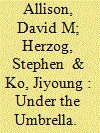

|
|
|
|
|
| Summary/Abstract |
How robust is public support for extended nuclear deterrence in patron and client states? Recent studies have improved scholarly understanding of US public opinion about nuclear weapon use against non-nuclear adversaries. Yet, there is limited knowledge of public attitudes regarding retaliation for nuclear strikes against US allies. We develop a theoretical typology of nuclear crises and investigate this phenomenon with a novel survey experiment (n = 6,623). Americans, Japanese, and South Koreans viewed realistic emergency alert messages about a most-likely case for nuclear retaliation: a North Korean missile attack on a US ally protected by the nuclear umbrella. Support for nuclear retaliation is low in all three countries, with important cross-national differences. Favorability increases with North Korean nuclear first-use, but it remains limited nonetheless. Surprisingly, US “tripwire” troop casualties do not increase Americans’ demands for nuclear retaliation. These findings have important implications for the study of nuclear crises and practice of extended deterrence.
|
|
|
|
|
|
|
|
|
|
|
|
|
|
|
|
| 6 |
ID:
186364
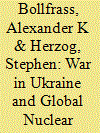

|
|
|
|
|
| Summary/Abstract |
The global nuclear order had been challenged in recent years by individual proliferators, the moribund US–Russian arms-control process and resultant frustration over stalled progress towards disarmament. Then Russia launched its full-scale invasion of Ukraine under cover of nuclear threats against NATO. This has neither exposed the international nuclear-governance regime as toothless nor brought it to the verge of collapse. The global nuclear order’s history shows its resilience to rogue acts by great powers. It will continue to serve key nuclear-capable states’ security and energy interests in the non-proliferation domain. Arms control between Washington and Moscow has always been sensitive to their strategic whims and can be reconstituted. The main consequence of Russian President Vladimir Putin’s war is renewed public awareness of the often unpalatable role nuclear weapons play in international politics. Nuclear targeting, deterrent threats and associated risk-reduction efforts are hardly new phenomena.
|
|
|
|
|
|
|
|
|
|
|
|
|
|
|
|
|
|
|
|
|